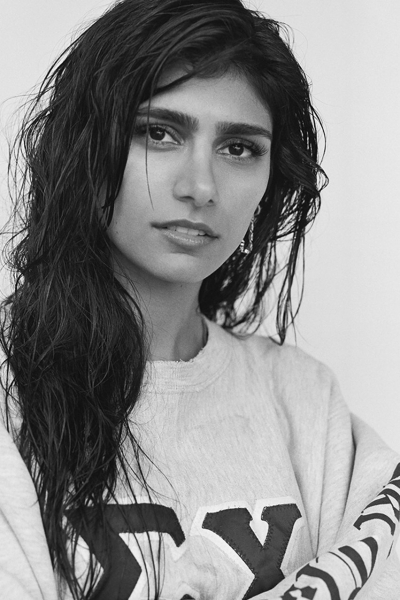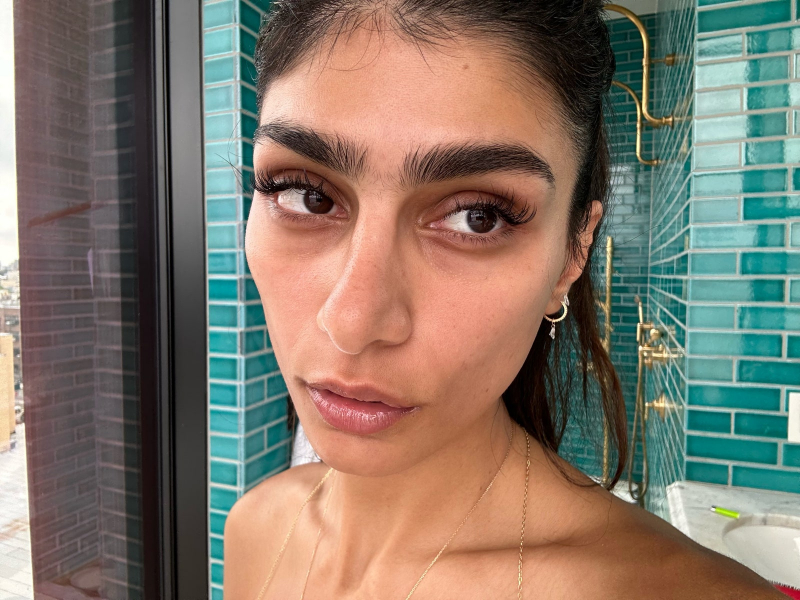Fashion muse, feminist activist, sports writer, social media sensation… Mia Khalifa wears many hats. After a brief stint working in the adult film industry, the 30-year-old has been carving out a space in fashion, becoming a front-row regular, a vintage style muse, a campaign star and, most recently, a jewellery designer. Now, Khalifa hopes to use her platform (she has 28 million Instagram followers) to empower other young women struggling to feel comfortable in their own skin – a topic she recently spoke about at the Oxford Union. Below, she recounts her unlikely journey so far in an essay for Vogue.

I grew up in Lebanon until I was eight, after which my family moved to Washington DC in 2001. It was a very confusing time for me, especially with the inherent racism towards Middle Eastern people that came after 9/11. Anyone who looked Middle Eastern was viewed as a threat. So not only did I not fit the dominant beauty standards at my new American school – which were all to do with being skinny, blonde and having blue eyes – how I looked actually made people uncomfortable, which was very difficult to reconcile as a young girl. At the same time, I didn’t fit in with Lebanese beauty ideals either, as I was very overweight. As a result, my relationship with beauty has been extremely difficult, and I’ve often struggled with issues around self-esteem.
It was partly down to having low self-esteem that, in 2014, I ended up working for a very brief period in the adult film industry. Deep down, I’m still confused as to why I was initially drawn to it. I don’t think I really knew what I was doing, but I do know that it’s been pretty much an uphill battle ever since in trying to get to where I want to be.
My time in the industry was a little bit like turning a light on, in that it really showed me how dangerous it is, and how much of an impact it has on young minds. Young men are absorbing a certain beauty standard, dictated by middle-aged white men in suits, which can be so unhealthy.
Since leaving the industry, I’ve tried as best as I can to control who is given access to me. I also put a lot more thought into the things I align with. For example, I’m a huge sports fan. I started my career writing a sports column and hosting a sports talk show on Complex, but I felt like I wasn’t moving forward doing that. The audience there wasn’t conducive to the things I wanted to do and talk about, and that’s understandable because it’s a predominantly male audience. Saying no to those sorts of jobs has helped me to take control of my image.
Fashion has given me the opportunity to express myself creatively. Recently, I have been lucky enough to work with a number of brands and publications who have been keen to collaborate with me, which I’ve found really empowering. It shows that my opinion is valuable, that I am not just seen as a face or a body or a conduit to get eyes on something. Fashion has also given me a sense of freedom and confidence, which has allowed me to embrace dressing for the female rather than the male gaze. It’s given me a louder voice, and helped me to embrace who I am. I’ve stopped trying to dress like a white girl, I’ve stopped trying to do my make-up like a white girl. It’s only for a short time that I’ve felt comfortable in my skin. It’s still very new to me, but I feel very grateful every day when I wake up and I don’t feel that weight of insecurity on my chest.
I turned 30 this year and every single person has been asking me, “Oh my God, how do you feel? Was it weird?” But I feel like I’m in my prime. I also grew my unibrow out earlier this year for a couple of months, and it was like giving my inner child a hug and telling her that it’s okay to look different. It was so jarring; I found myself being complimented on something that I used to be bullied for. While I’m happy with how far my relationship with myself has come, it hasn’t been easy.

Another milestone has been working on my jewellery brand Sheytan. It’s been the most exciting, most terrifying thing I’ve ever tried to do. I wanted to create something born from my heart, my heritage, and from my culture. I really feel both Middle Eastern and American. Sheytan speaks to this. It also speaks to the limitations my culture has placed on me (hence the name, an attempt to reclaim the term Sheytan – which means evil spirit – as a sign of power). I wear my pieces like a second skin or armour, I never remove them, they are part of me.
Moving forwards, I hope to continue on this path, to remain inspired, to create and collaborate, blending ideas, opinions and voices.
If I could give women who don’t feel comfortable in their own skin a piece of advice it would be this: don’t look around you, look inside of you. Forge your own set of laws to live by, and prioritise your integrity above all else. In a room full of beautiful women, take your confidence from the fact that no one can do what it is that makes you unique. No one can love like you, no one can bake a banana bread like you, no one can earnestly listen to a story like you, no one can unwaveringly stand by what they believe in the way you do. That’s where confidence comes from… things that don’t fade with age and time, but rather, get stronger.



